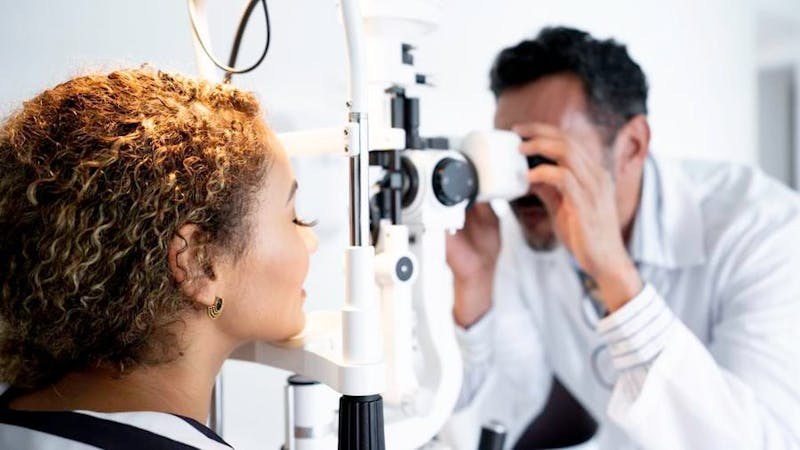
For people who struggle with seeing clearly without the help of eyeglasses or contact lenses, LASIK eye surgery could be worth considering. And for many, it is—according to the Refractive Surgery Council (RSC), there have been more than 40 million successful LASIK eye surgeries performed around the world since its U.S. Food and Drug Administration (FDA) approval 20 years ago.
Promising statistics aside, considering LASIK eye surgery comes with a lot of questions. One that’s especially important is how much LASIK costs and if it’s ever covered by insurance. While it’s always a good idea to check with your insurance provider before scheduling a surgery, below, you’ll learn more about LASIK, the costs associated with the procedure and what you can expect in terms of coverage.
What Is LASIK Eye Surgery?
LASIK (laser-assisted in situ keratomileusis) is an eye surgery procedure that uses lasers to fix common vision issues like farsightedness, nearsightedness and astigmatism. Two lasers are used to permanently reshape the cornea by removing a small amount of tissue from the area.
During LASIK the person undergoing the procedure is awake, and their eyes are numbed with eye drops. The surgeon uses an eyelid holder to keep the person from blinking, and they may feel some pressure and experience their vision going dim or black. The surgeon will use a femto laser to make a very thin flap in the cornea, then lift it back. “The second laser is a wavefront, excimer laser, which breaks up the bonds of the outer surface of the cornea and corrects the refractive error,” Dr. Dello Russo says. The person undergoing the procedure is instructed to stare at a light while their cornea is reshaped, then the surgeon will fold the flap back into a position where it attaches on its own.
The ultimate goal is to correct your refractive error (the most common type of vision problem that makes it hard to see clearly) to improve your vision. LASIK can diminish the need for glasses or contacts, or even correct your vision completely. Research from 2016 found 99% of people achieved better than 20/40 vision with the procedure, and more than 90% achieved 20/20 or better[2].
That said, LASIK is an elective surgery and is not typically considered medically necessary. Candidates for LASIK typically have to meet the following criteria:
- You must be 18 years or older
- Your eye prescription should remain the same for at least one year
- Your refractive error has to be able to be fixed by LASIK (you must be evaluated by a certified and qualified refractive surgeon to get LASIK. Some things that can disqualify a person would be eye conditions like corneal issues, excessively dry eyes and mismatches between prescription and other measurement parameters.)
- You don’t have a disease (like an autoimmune disease) or are on medication that might prevent proper healing
- You don’t participate in contact sports regularly
- You don’t have certain vision issues such as blepharitis, large pupils, thin corneas or dry eyes
- You haven’t had refractive surgery in the past
“LASIK is painless, rapidly healing and permanently treats refractive errors of the cornea,” says Dr. Dello Russo. According to research, LASIK eye surgery has a 96% satisfaction rate, one of the highest patient satisfaction rates of any elective procedure. There have been more than 7,000 clinical studies done on the safety of LASIK[3].
It’s important to note that many patients will need a “touch-up” for regression. Patients should inquire about what is included prior to signing up for the procedure, such as the fee they are paying and if it includes any re-treatment expenses. While it can vary from center to center, some will offer a one-year re-treatment with no additional cost.
Because LASIK is an elective surgery, more often than not it is not covered by insurance. However, some non-standard vision insurance plans, such as VSP or EyeMed, may offer benefits or discounts. Some of these benefits might include additional services and savings for people who are interested in LASIK.
Larger insurance companies like Aetna, Blue Cross-Blue Shield, Cigna, UnitedHealth and Humana might also offer some benefits for laser vision correction. These may include discount offers on procedures (especially ones done by in-network surgeons) or frame benefits for non-prescription sunglasses after the surgery. It’s worth speaking to a representative from your insurance company to find out your options.
Does Medicare Cover LASIK Surgery?
This elective surgery is not covered by Original Medicare (Parts A and B), which does not include routine eye care but might cover medically necessary eye exams or surgery related to a medical condition. Medicare Advantage (MA) plans will also not cover LASIK, but they might offer additional benefits. MA plans might include routine vision care like annual exams, corrective glasses, contact lenses and/or frames. Be sure to check with your provider to find out.
How to Save on LASIK
The national average cost of LASIK surgery is $4,400, according to the RSC[4]. This can be a significant cost for many, and while your insurance provider may not cover this surgery, there are some ways to get assistance in covering the cost.
- Call your insurance company to find out if they offer any sort of benefit or discounts for LASIK surgery
- Speak to the surgeon to find out if they offer financing options
- Use funds from Flexible Spending Arrangements (FSAs) and Health Savings Accounts (HSAs) if possible.
“Actuary tables predict that the earlier in life that you have LASIK, the more you save,” says Dr. Dello Russo.
LASIK is a quick procedure that can drastically improve or correct your vision for the rest of your life. Even though it’s not typically covered by insurance, many find that it’s worth the hefty price tag.
Footnotes
- LASIK. American Refractive Surgery Council. Accessed 12/5/2022.
- LASIK. American Refractive Surgery Council. Accessed 12/5/2022.
- LASIK. American Refractive Surgery Council. Accessed 12/5/2022.
- LASIK. American Refractive Surgery Council. Accessed 12/5/2022.
References
- Sandoval H, Donnenfeld E, Kohnen T, Lindstrom R, Potvin R, Tremblay D, Solomon K. Modern laser in situ keratomileusis outcomes. Journal of Cataract and Refractive Surgery. 2016;42(8):1224-1234.
- LASIK. American Refractive Surgery Council. Accessed 12/5/2022.
- LASIK – Laser Eye Surgery. American Academy of Ophthalmology. Accessed 12/5/2022.
- When is LASIK Not For Me?. U.S. Food & Drug Administration. Accessed 12/5/2022.
- What Should I Expect Before, During & After Surgery?. U.S. Food & Drug Administration. Accessed 12/5/2022.
- Will Medicare Cover LASIK Eye Surgery?. Medicare. Accessed 12/5/2022.
- Does Insurance Cover LASIK? The Update For 2022. American Refractive Surgery Council. Accessed 12/5/2022.
